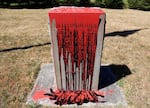Just off Interstate 5 near Ridgefield, three Confederate flags fly along the busy freeway in southwest Washington.
Below them are two stone markers honoring Jefferson Davis, president of the Confederacy.
On Friday morning, both were found covered in black and red paint, with a sign left behind that read “Solidarity, take them all down.”

Two stone markers honoring Jefferson Davis in Clark County were discovered covered in black and red paint Friday morning.
Molly Solomon / OPB
The activist group Portland Antifa told The Portland Mercury that they're responsible for tarring the monument and that it was done as an act of solidarity with "comrades in Charlottesville, Virginia."
In the wake of last week’s violence in Charlottesville, monuments like these have come under fire, with some people calling for their removal.
“I’ve had a lot of phone calls over it, especially since it’s right next to I-5,” said Clark County Council Chair Marc Boldt. “A lot of people are saying tear it down.”
“The city of Ridgefield has been clear that we absolutely don't condone the racist symbolism of the marker,” said Ridgefield city manager Steve Stuart. “And frankly we’d love it if it was not anywhere near Ridgefield.”
But neither the county nor the city of Ridgefield has the jurisdiction to remove the monument. That’s because the stone markers sit on a plot of private land, purchased for $15,000 in 2007 by the Pacific Northwest chapter of Sons of Confederate Veterans, a nonprofit whose members have ancestral ties to Confederate soldiers.

Confederate flags and stone markers honoring Jefferson David, the only President of the Confederacy were defaced Friday outside of Ridgefield, Washington.
Molly Solomon / OPB
They moved the two markers to the field, named Jefferson Davis Park, after the cities of Vancouver and Blaine, Washington voted to remove them.
“Jefferson Davis was secretary of war long before he was in the Confederacy,” said John Sigmon, division commander for the Pacific Northwest division of Sons of Confederate Veterans.
“It’s not a symbol of racism,” Sigmon insists of the flag and the Confederate monuments. “We’re as entitled to honor our ancestors as any other group in America.”
Most symbols of the Confederacy are in the South, so Jefferson Davis Park seems out of place in southwest Washington.
“There’s a connection, but it’s a pretty tenuous connection,” said local historian and former Vancouver City Councilwoman Pat Jollota.
She describes how America in the 1930s developed a romanticized version of the Confederate cause. Highways across the nation were named Jefferson Davis Highway, including Highway 99 in Washington.
Jollota says Vancouver was chosen as the resting place for the stone marker because when Jefferson Davis was secretary of war, he signed the document that created Vancouver Barracks.
“It was set up there in Vancouver, and there it remained,” she said. “Until somebody didn’t want it there anymore.”
Related: After Charlottesville, Southern Cities Consider What To Do With Confederate Monuments
That came in 1998, at the urging of Vancouver City Manager Vernon Stoner and then City Councilman Jim Moeller. In 2002, a Washington legislator proposed changing the name of the highway entirely. The markers were finally removed four years later and erected in 2007 on the private plot of land.
“I’m of the opinion that all history should be taught, good or bad,” said Jollota, who wishes there was an educational component to the Confederate marker. “But it really was interfering with work at the city.”
For Sigmon and the Sons of Confederate Veterans, the recent vandalism won’t deter them.
“When push comes to shove, we’re not wallflowers or patsies,” said Sigmon. “We will defend our property with whatever means are considered appropriate.”
Sigmon told OPB they have hired armed guards to watch the park in shifts until they believe the monuments are safe from further vandalism.
“We aren’t going anywhere,” he said. “And those flags aren’t going anywhere either.”